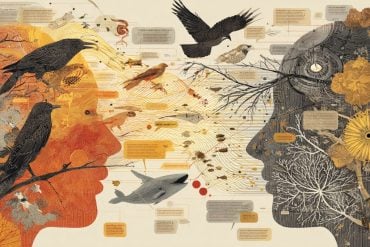Summary: Adults with happy childhood memories report better physical health and lower instances of depression than those with less positive early memories, a new study reports.
Source: American Psychological Association.
People who have fond memories of childhood, specifically their relationships with their parents, tend to have better health, less depression and fewer chronic illnesses as older adults, according to research published by the American Psychological Association.
“We know that memory plays a huge part in how we make sense of the world — how we organize our past experiences and how we judge how we should act in the future. As a result, there are a lot of different ways that our memories of the past can guide us,” said William J. Chopik, PhD, from Michigan State University and lead author of the study. “We found that good memories seem to have a positive effect on health and well-being, possibly through the ways that they reduce stress or help us maintain healthy choices in life.”
The findings were published in the journal Health Psychology.
Previous research has shown a positive relationship between good memories and good health in young adults, including higher quality of work and personal relationships, lower substance use, lower depression and fewer health problems, according to Chopik. He and his co-author, Robin Edelstein, PhD, from the University of Michigan, Ann Arbor, wanted to see how this would apply to older adults.
Also, much of the existing research focused on mothers and rarely examined the role of fathers in child development. Chopik and Edelstein sought to expand on the existing studies to include participants’ reflections of their relationships with both parents.
The researchers used data from two nationally representative samples, the National Survey of Midlife Development in the United States and the Health and Retirement Study, with a total of more than 22,000 participants. The first study followed adults in their mid-40s for 18 years and the second followed adults 50 and over for six years. The surveys included questions about perceptions of parental affection, overall health, chronic conditions and depressive symptoms.
Participants in both groups who reported remembering higher levels of affection from their mothers in early childhood experienced better physical health and fewer depressive symptoms later in life. Those who reported memories with more support from their fathers also experienced fewer depressive symptoms, according to Chopik.
“The most surprising finding was that we thought the effects would fade over time because participants were trying to recall things that happened sometimes over 50 years ago. One might expect childhood memories to matter less and less over time, but these memories still predicted better physical and mental health when people were in middle age and older adulthood,” said Chopik.
There was a stronger association in people who reported a more loving relationship with their mothers, noted Chopik, but that might change.
“These results may reflect the broader cultural circumstances of the time when the participants were raised because mothers were most likely the primary caregivers,” said Edelstein. “With shifting cultural norms about the role of fathers in caregiving, it is possible that results from future studies of people born in more recent years will focus more on relationships with their fathers.”

Chopik and Edelstein found that participants with positive childhood memories also had fewer chronic conditions in the first study of 7,100 people, but not in the second study of 15,200, making the results less straightforward
That may be because chronic conditions such as diabetes, thyroid disease and high blood pressure were rare in both samples, said Chopik. Future studies in this area could focus more closely on childhood memories in older adults with chronic conditions.
Source: American Psychological Association
Publisher: Organized by NeuroscienceNews.com.
Image Source: NeuroscienceNews.com image is in the public domain.
Original Research: Abstract for “Retrospective memories of parental care and health from mid- to late life. by Chopik, William J. and Edelstein, Robin S. in Health Psychology. Published October 2018.
dio:10.1037/hea0000694
[cbtabs][cbtab title=”MLA”]American Psychological Association”Happy Childhood Memories Linked to Better Health in Later Life.” NeuroscienceNews. NeuroscienceNews, 2 November 2018.
<https://neurosciencenews.com/childhood-memory-health-10145/>.[/cbtab][cbtab title=”APA”]American Psychological Association(2018, November 2). Happy Childhood Memories Linked to Better Health in Later Life. NeuroscienceNews. Retrieved November 2, 2018 from https://neurosciencenews.com/childhood-memory-health-10145/[/cbtab][cbtab title=”Chicago”]American Psychological Association”Happy Childhood Memories Linked to Better Health in Later Life.” https://neurosciencenews.com/childhood-memory-health-10145/ (accessed November 2, 2018).[/cbtab][/cbtabs]
Abstract
Retrospective memories of parental care and health from mid- to late life
Objective: Perceptions of early caregiving experiences are hypothesized to be influential across the life span. However, previous research testing this hypothesis focuses primarily on young adults and use mostly cross-sectional designs. The current study examined associations between memories of early caregiving experiences and trajectories of depressive symptoms and physical health in 2 large samples of middle-aged and older adults.
Method: Sample 1 consisted of participants from the National Survey of Midlife Development in the United States (n = 7,108) followed for 18 years (from 1995/1996 until 2013/2014). Sample 2 consisted of participants from the Health and Retirement Study (n = 15,234) followed over a 6-year period. Memories of caregiver support before age 18 were retrospectively assessed in middle and older adulthood; associations between these memories and changes in self-rated health, chronic health conditions, and depressive symptoms over time were examined.
Results: Memories of higher parental affection in early childhood were associated with better self-rated health and lower depressive symptoms over intervals of approximately 6 and 18 years, in both samples; the results for chronic health conditions was more mixed. These associations persisted over time and were not moderated by time.
Conclusion: Associations between perceptions of caregiver support and health persisted over time, underscoring the importance of memories of close relationships for health and depressive symptoms across the life span, even into late life. Findings are discussed in relation to models that link perceptions of early life experiences to later life outcomes.






